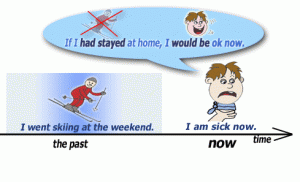The third conditional (also called conditional type 3) is a structure used for talking about unreal situations in the past. This page will explain how the third conditional is formed, and when to use it.
Like the other conditionals, a third conditional sentence consists of two clauses, an “if” clause and a main clause:
Explanation: I failed the exam, because I didn't study hard enough.
If the “if” clause comes first, a comma is usually used. If the “if” clause comes second, there is no need for a comma:
We use different verb forms in each part of a third conditional:
*The past perfect is formed with the auxiliary verb “had”, and the past participle (or third form) of the verb.
Note also that third conditional forms can be contracted:
| IF clause | main clause |
|---|---|
| If I had studied harder, | I would have passed the exam. |
If the “if” clause comes first, a comma is usually used. If the “if” clause comes second, there is no need for a comma:
| main clause | IF clause |
|---|---|
| I probably would have passed the exam | if I had studied harder. |
| IF clause | if + subject + past perfect verb* |
|---|---|
| main clause | subject + would (OR could, OR might) have + past participle |
Note also that third conditional forms can be contracted:
| Full form | If I had studied harder, I probably would have passed the exam. |
|---|---|
| Contracted form | If I'd studied harder, I probably would've passed the exam. |
Using the third conditional
The third conditional is used to talk about things which did not happen in the past. If your native language does not have a similar construction, you may find this a little strange, but it can be very useful. It is often used to express criticism or regret:


The first conditional and second conditionals talk about the future. With the third conditional we talk about the past. We talk about a condition in the past that did not happen. That is why there is no possibility for this condition. The third conditional is also like a dream, but with no possibility of the dream coming true.
Last week you bought a lottery ticket. But you did not win. :-(

| condition | result | |
| Past Perfect | WOULD HAVE + Past Participle | |
| If | I had won the lottery | I would have bought a car. |

| IF | condition | result |
| past perfect | WOULD HAVE + past participle | |
| If | I had seen Mary | I would have told her. |
| If | Tara had been free yesterday | I would have invited her. |
| If | they had not passed their exam | their teacher would have been sad. |
| If | it had rained yesterday | would you have stayed at home? |
| If | it had rained yesterday | what would you have done? |
| result | IF | condition |
| WOULD HAVE + past participle | past perfect | |
| I would have told Mary | if | I had seen her. |
| I would have invited Tara | if | she had been free yesterday. |
| Their teacher would have been sad | if | they had not passed their exam. |
| Would you have stayed at home | if | it had rained yesterday? |
| What would you have done | if | it had rained yesterday? |
| Example | Explanation |
|---|---|
| If you had driven more carefully, you would not have had an accident. | Criticism: You had an accident because you didn't drive carefully enough. |
| If we had played a little better, we could have won the game. | Regret: We didn't play well, so we lost the game. |
| If you had saved your money, you could have bought a computer. | Criticism: You didn't save your money, so now you can't afford a computer. |
| If it had snowed, we could have gone skiing. | Regret: It didn't snow, so we couldn't go skiing. |
Here are some examples traslate
LETS PRACTICE :) ...
1. Complete the following sentences with the THIRD CONDITIONAL. Use abbreviations for the negative verbs:

a) If Jane (not/lose) her job as a sales representative in London, she (not/move) to Edinburgh.
b) If she (not/move) to Edinburgh, she (not/find) a job in a new company.
c) If she (not/find) a job in the new company, she (not/meet) Adam.
d) If she (not/meet) Adam, they (not/fall) in love.
e) If they (not/fall) in love, Adam (not/ask) Jane to marry him.

f) If Michael's alarm clock (ring) on time, he (have) time to have breakfast at home.
g) If he (have) breakfast and home, he (feel) more relaxed.
h) If he (feel) more relaxed, he (not/drive) so fast.
i) If he (drive) slowly, he (see) the "STOP" sign.
j) If he (see) the sign, he (not/crash) against the other car.
2. Choose the correct ending for the following sentences:
a) If the weather had been better yesterday,
b) If Jane had arrived on time last night,
c) If I had studied more for my exams,
d) We would have had a wonderful weekend
e) The party would have been funnier
Heres this video
HERE YOU CAN PRACTICE MORE... http://www.perfect-english-grammar.com/third-conditional-exercise-1.html










